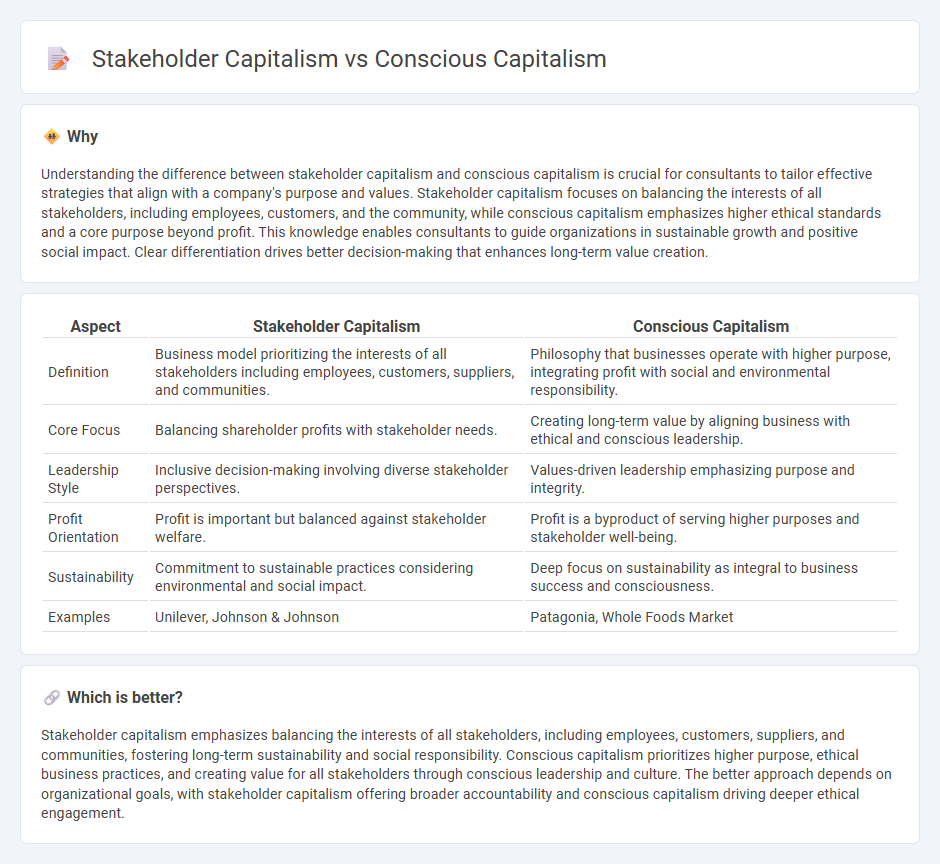
Stakeholder capitalism emphasizes the importance of balancing interests among all parties involved in a business, including employees, customers, communities, and shareholders. Conscious capitalism, however, integrates higher purpose and ethical leadership into core business strategies to create value beyond profit. Explore the distinctions and strategic implications of these models to enhance sustainable growth and corporate responsibility.
Why it is important
Understanding the difference between stakeholder capitalism and conscious capitalism is crucial for consultants to tailor effective strategies that align with a company's purpose and values. Stakeholder capitalism focuses on balancing the interests of all stakeholders, including employees, customers, and the community, while conscious capitalism emphasizes higher ethical standards and a core purpose beyond profit. This knowledge enables consultants to guide organizations in sustainable growth and positive social impact. Clear differentiation drives better decision-making that enhances long-term value creation.
Comparison Table
| Aspect | Stakeholder Capitalism | Conscious Capitalism |
|---|---|---|
| Definition | Business model prioritizing the interests of all stakeholders including employees, customers, suppliers, and communities. | Philosophy that businesses operate with higher purpose, integrating profit with social and environmental responsibility. |
| Core Focus | Balancing shareholder profits with stakeholder needs. | Creating long-term value by aligning business with ethical and conscious leadership. |
| Leadership Style | Inclusive decision-making involving diverse stakeholder perspectives. | Values-driven leadership emphasizing purpose and integrity. |
| Profit Orientation | Profit is important but balanced against stakeholder welfare. | Profit is a byproduct of serving higher purposes and stakeholder well-being. |
| Sustainability | Commitment to sustainable practices considering environmental and social impact. | Deep focus on sustainability as integral to business success and consciousness. |
| Examples | Unilever, Johnson & Johnson | Patagonia, Whole Foods Market |
Which is better?
Stakeholder capitalism emphasizes balancing the interests of all stakeholders, including employees, customers, suppliers, and communities, fostering long-term sustainability and social responsibility. Conscious capitalism prioritizes higher purpose, ethical business practices, and creating value for all stakeholders through conscious leadership and culture. The better approach depends on organizational goals, with stakeholder capitalism offering broader accountability and conscious capitalism driving deeper ethical engagement.
Connection
Stakeholder capitalism and conscious capitalism both prioritize ethical business practices that create value for all parties involved, including employees, customers, communities, and shareholders. These models emphasize long-term sustainability, social responsibility, and inclusive growth as core principles guiding corporate decision-making. By integrating purpose-driven strategies, companies foster trust and collaboration among stakeholders, driving positive social and economic outcomes.
Key Terms
Purpose-driven
Conscious capitalism emphasizes a higher purpose beyond profit, integrating social and environmental responsibility into business practices while aligning with stakeholders' interests. Stakeholder capitalism prioritizes balancing the needs of all stakeholders, including employees, customers, communities, and shareholders, aiming for sustainable value creation. Explore more about how purpose-driven strategies differentiate these models and impact long-term business success.
Profit maximization
Conscious capitalism emphasizes creating long-term value for all stakeholders, including employees, customers, suppliers, communities, and the environment, rather than solely focusing on short-term profit maximization. Stakeholder capitalism promotes balancing diverse interests to achieve sustainable business performance, recognizing that profit is essential but not the sole objective. Explore how both models redefine success in modern business by prioritizing ethical and inclusive strategies.
Social responsibility
Conscious capitalism emphasizes a purpose-driven approach where businesses actively pursue social responsibility by creating value for all stakeholders, including employees, customers, communities, and the environment. Stakeholder capitalism prioritizes balancing the interests of various stakeholders, focusing on sustainable growth and ethical practices to ensure long-term value creation and social impact. Explore deeper insights into how these models shape corporate social responsibility and influence modern business ethics.
Source and External Links
How the Four Tenets of Conscious Capitalism Drive Purpose and ... - Conscious capitalism is a business philosophy focusing on ethical leadership, stakeholder orientation, and higher purpose that aligns business success with social and environmental good through four interconnected principles.
Conscious Capitalism - Raj Sisodia - Conscious Capitalism is a philosophy that integrates higher purpose, stakeholder interests, conscious leadership, and a caring culture into businesses while achieving superior financial performance.
Conscious Capitalism - John Mackey - Conscious Capitalism promotes building businesses that serve all stakeholders and the environment by embracing higher purpose, stakeholder integration, conscious leadership, and culture for a more humane capitalism.
 dowidth.com
dowidth.com